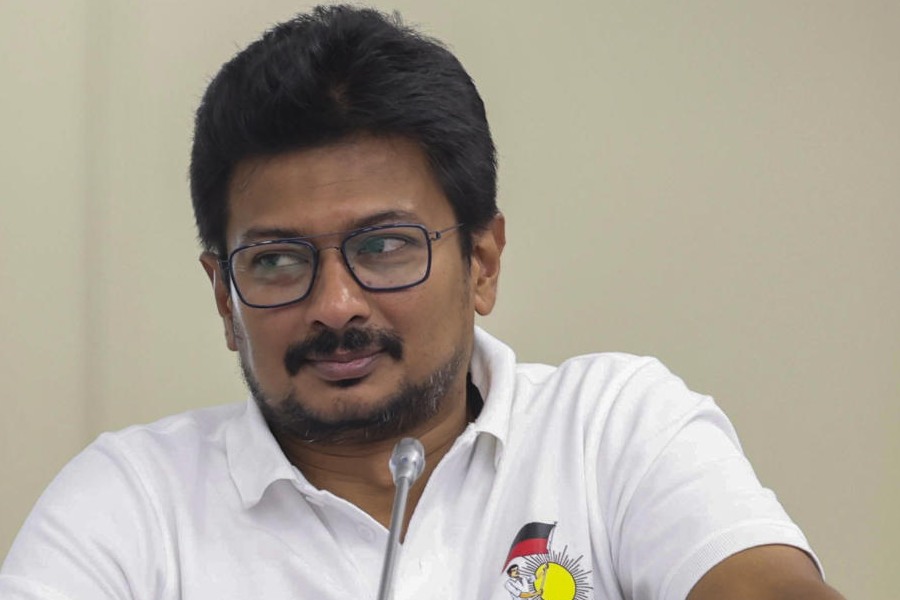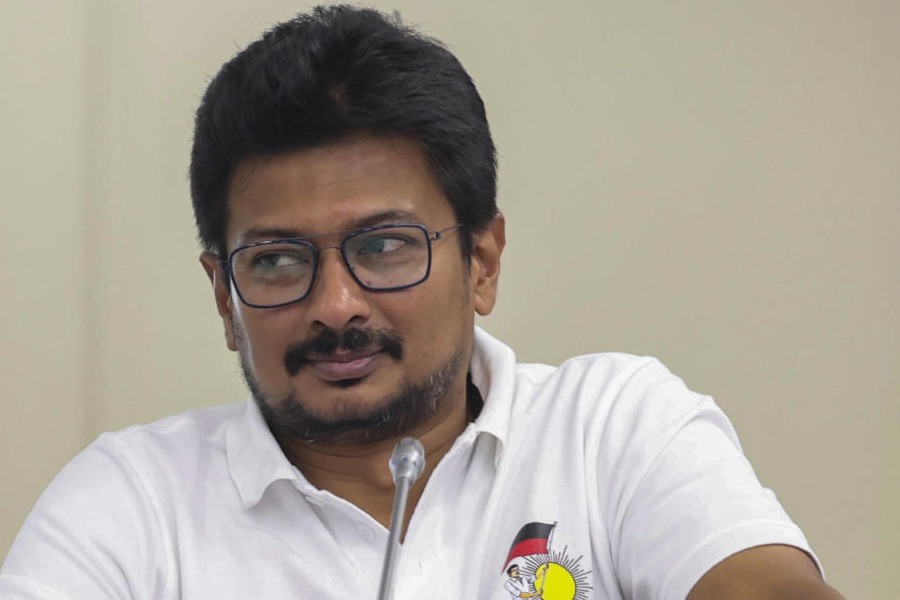Deploring that many north Indian states lacked a film industry of their own to protect their identity and cultural ethos, as the south does, Tamil Nadu Deputy Chief Minister Udhayanidhi Stalin on Saturday said if states failed to protect their own languages, then Hindi will take over and erode their identities.
This was the reason why the Dravidian movement is against Hindi imposition, but it did not have any animosity towards that language, he said.
Speaking on literary and linguistic ethos in Dravidian politics, he said the Dravidian political movement in Tamil Nadu, known for its strong linguistic and cultural pride, has held long the literature and language as its foundation pillars.
"This fusion of literary, linguistic, and political ethos created a powerful identity that profoundly shaped Tamil Nadu's social and political landscape," he said, speaking at the Art and Literature festival of Manorama Daily group at Kozhikode today.
He said both Tamil Nadu and Kerala were the two most progressive states in India and both have successfully kept the fascist and communal forces at bay.
The Dravidian leaders invoked Tamil literature to propagate nationalism and scientific temper and leaders like C N Annadurai and M Karunanidhi popularised Tamil literature among the people. The self-respect movement, the fore-runner of the Dravidian movement, rose to resist what it saw a cultural and linguistic domination, he said.
The Dravidian movement placed Tamil as a core of its identity and Tamil wasn't seen merely as a medium of communication but as a voice of the community seeking recognition, dignity, and independence from the Hindi imposition, he added.
"The push to make Hindi as an official language during the 1930s and later in the 1960s stimulated the Dravidian movement which perceived it as an excessive threat to Tamil culture and linguistic identity," Udhayanidhi said at the event.
The Dravidian movement recognised the potential of literature to serve both as a cultural force and as a vehicle of social change. Rationalist leader Periyar's writings, manifestos and editorials condemned caste-based oppression, male-dominant practices and rigid social structure.
"Our leaders harnessed literature to connect with the masses...the speeches of Annadurai and Kalaignar (Karunanidhi) infused literary references and made the political philosophy of the Dravidian movement easily understandable by the masses," Udhayanidhi said.
"Our leaders' work echoed the Dravidian movement's core values of equality, rationalism and anti-religious beliefs," the deputy chief minister said. This was reflected in Tamil Nadu's language policy (of Tamil and English) and in preserving the unique Tamil identity.
"Even today, the pride in Tamil language and literature fuels policies and discussions about state autonomy and cultural excellence," he said.
Earlier, Tamil Nadu's stand on linguistic insubordination had been seen as divisive by the nationalists. They thought that opposition to Hindi imposition would eventually lead to the nation's disunity. However, after many decades, history has proved otherwise that the "so called nationalists who still want to impose Hindi on all non-Hindi speaking states are indeed divisive and a threat to national unity," he said.
As Dravidian leaders expanded their reach, Tamil cinema became an influential platform to amplify the Dravidian ideology. Before 1950s, Tamil cinemas were heavily Sanskritised, and released with anti-scientific themes. The advent of the Dravidian movement altered the situation and after 1950s, cinemas emerged as dominant medium for political messages with movies delivering socially conscious narratives and dialogues addressing the masses.
"Before entering politics, I had a small stint in the Tamil film industry, which is doing business in the billions. Similarly, we have a thriving film industry in Kerala. I like most of the Malayalam films made in recent times. Likewise, Telugu and Kannada are also performing well," he said.
He sought to know if any other languages in any north Indian state have grown like the vibrant film industry in south India. "The answer is a very big no," he said and added that all languages in north India have given way to Hindi.
As a result, they have only Hindi films and other north Indian languages received far less attention compared to Hindi films.
"Sadly, many other states in north India do not even have their own film industry. If we fail to protect our own language, then Hindi will take over our culture and erode our identities. That's why the Dravidian movement is against Hindi imposition but does not have any animosity on that language," he said.
Political parties in Tamil Nadu except the BJP should emphasise the two-language formula introduced by the DMK to survive in the Tamil Nadu political landscape, he said and recalled that Governor R N Ravi refused to read the words Tamil Nadu in the state assembly but instead said Tamilagam.
"Both of us face a threat from the BJP which is trying to impose one nation, one election, one culture, and religion concept. Let us stand together and protect our language, culture and literature from the fascist BJP," he appealed.
Except for the headline, this story has not been edited by The Telegraph Online staff and has been published from a syndicated feed.











